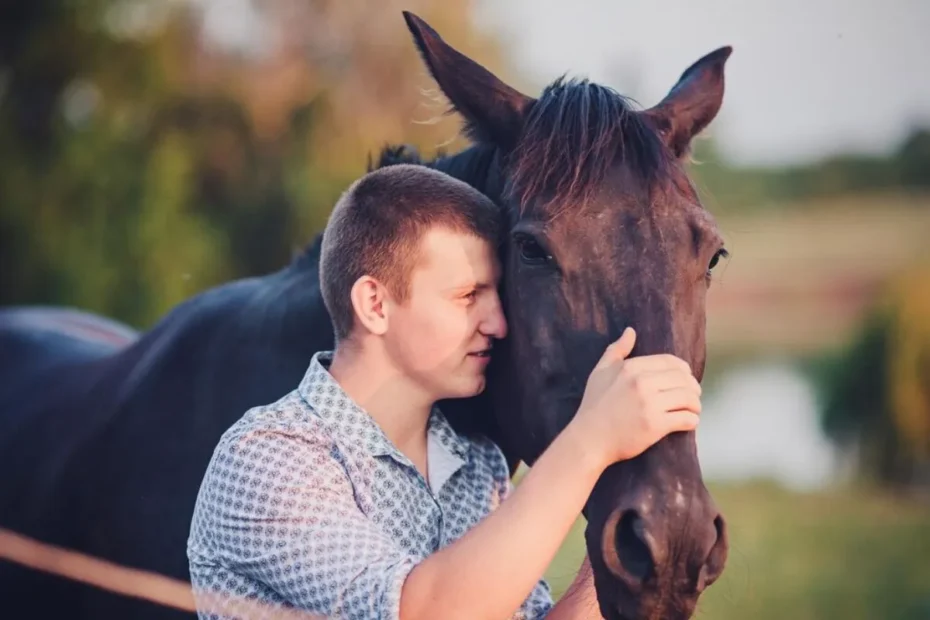Techniques for Calming Anxious Horses are essential for horse owners and trainers. Understanding how to handle an anxious horse improves horse care and training success.
Addressing anxiety in horses involves natural methods and stress relief practices. Proper techniques can transform an anxious horse into a calm companion.
In this article, we’ll explore five proven techniques for calming your equine friend. These methods encompass a variety of approaches to ensure relaxation and comfort.
Understanding Horse Anxiety
Before diving into techniques for calming anxious horses, it’s essential to understand why horses become anxious. Anxious behaviors can stem from various factors.
Stress, fear, and unfamiliar environments often trigger anxiety in horses. Recognizing these signs helps in providing timely interventions.
Common signs of anxiety in horses include pacing, sweating, and excessive vocalizations. Identifying these signs early can prevent escalated behaviors.
Causes of Anxiety in Horses
Several factors contribute to equine anxiety. Moving to a new environment or encountering unfamiliar objects can be stressful.
Improper training techniques may also lead to anxiety. Horses are sensitive creatures and require gentle handling.
Other causes include health issues, lack of socialization, and past trauma. Addressing these underlying causes is crucial for effective anxiety management.
Techniques for Calming Anxious Horses
Employing various techniques for calming anxious horses can ensure a stable and relaxed horse. Here are five effective methods:
1. Groundwork Training
Groundwork training is fundamental in calming anxious horses. This technique involves exercises conducted on the ground, promoting trust and understanding.
Start with simple commands and gentle pressure release. Reward calm behavior to reinforce positive responses.
This method builds a strong bond and establishes your role as a leader. Consistent groundwork can transform an anxious horse into a confident one.
- Lead the horse through various obstacles.
- Practice yielding the hindquarters and forequarters.
- Incorporate desensitization exercises.
2. Natural Horsemanship
Natural horsemanship focuses on understanding the horse’s psychology. This technique uses the horse’s instincts and body language to communicate.
Establishing a mutual language helps in managing anxiety. Use gentle, consistent cues to guide the horse’s behavior.
Respect and patience are key components. Natural horsemanship fosters a deeper connection and reduces stress.
3. Aromatherapy
Aromatherapy is a natural method to promote relaxation. Essential oils like lavender and chamomile can have calming effects.
Introduce these scents gradually to avoid overstimulation. Use a diffuser in the stables or apply diluted oils to a cloth.
Aromatherapy can be an effective part of your horse care routine. It provides a soothing atmosphere and alleviates anxiety.
4. Consistent Routine
Horses thrive on consistency. Maintaining a regular routine helps in reducing uncertainty and stress.
Feed and exercise your horse at the same times daily. Predictability in their environment fosters a sense of security.
A consistent routine is a fundamental aspect of equine stress relief. It creates a stable and familiar environment.
5. Environmental Enrichment
Providing environmental enrichment can greatly reduce anxiety. Enrichment activities stimulate the horse mentally and physically.
Incorporate toys, varied terrains, and social interactions. These activities keep the horse engaged and reduce boredom-related stress.
Enrichment is an essential part of horse care. It promotes well-being and counters anxious behaviors.
Additional Tips for Easing Horse Anxiety
Beyond the main techniques, there are additional methods to consider. These tips complement the primary techniques and offer further support.
Nutrition and Supplements
Diet plays a significant role in managing anxiety. Ensure your horse’s diet is balanced with all necessary nutrients.
Consider supplements like magnesium and omega-3 fatty acids. These can have calming effects on the nervous system.
Always consult a veterinarian before making dietary changes. Proper nutrition supports overall equine health and behavior.
Regular Veterinary Check-ups
Regular veterinary care is crucial, as health issues can exacerbate anxiety, so it’s important to keep up with check-ups. Your vet can identify underlying issues that might cause stress, and early intervention can prevent these issues from escalating. Regular check-ups allow for timely detection and treatment of potential health problems.
Consistent veterinary care ensures your horse remains healthy and calm. It is an essential element of overall horse care, providing a foundation for both physical and mental well-being. By maintaining regular veterinary visits, you can address any health concerns promptly, reducing the likelihood of stress-related behaviors.
Incorporating regular veterinary care into your routine promotes a healthier and more content horse. This proactive approach to health management helps in preventing issues before they become severe, ensuring that your horse remains in the best possible condition. By prioritizing veterinary care, you contribute significantly to your horse’s long-term well-being.
Integrating Techniques into Daily Routine
Consistency is the key to success. Integrate these techniques into your horse’s daily routine.
Create a schedule that incorporates training, enrichment, and relaxation. Consistency helps in building trust and reducing anxiety.
Monitor your horse’s responses and adjust as needed. Flexibility allows for tailored approaches to meet individual needs.
Monitoring Progress
Track your horse’s behavior changes over time, as keeping a journal can be helpful in noting improvements or setbacks. Small changes can indicate progress, and celebrating these milestones can maintain motivation. Observing and recording these changes helps in understanding the effectiveness of your training and care strategies.
Adjust techniques based on your observations. Personalizing approaches ensures the best outcomes for your horse. Tailoring your methods to suit your horse’s unique needs and responses leads to more effective and positive results. This individualized approach enhances the bond between you and your horse.
By maintaining a detailed record and being adaptable in your training techniques, you can provide the most supportive and responsive care for your horse. This commitment to observation and adjustment fosters a healthier, happier, and more cooperative relationship.
Finding Professional Help
Sometimes, professional help may be necessary. Consulting a horse trainer can provide specialized techniques and insights.
An equine behaviorist can address more severe cases of anxiety. Professional guidance ensures appropriate strategies.
Don’t hesitate to seek help when needed. Professional support can make a significant difference in managing equine anxiety.
Key Points to Remember
- Recognize signs of anxiety early.
- Use a combination of techniques for best results.
- Consistency and patience are crucial.
- Consult professionals when necessary.
Ensuring a Calm Future
Managing horse anxiety is an ongoing process. Incorporating these techniques ensures a calm and happy equine companion.
Remember to monitor progress and adjust methods as needed. A relaxed horse leads to successful training and better horse care.
Prioritizing your horse’s mental well-being is vital. Start implementing these techniques today for a stress-free equine future.
Frequently Asked Questions
What are common signs of anxiety in horses?
Common signs include pacing, excessive sweating, and vocalizations. Other signs can be tail swishing, head tossing, and reluctance to move forward.
Can aromatherapy really help calm horses?
Yes, essential oils like lavender and chamomile are known to have calming effects. However, it’s important to introduce them gradually.
How often should I do groundwork training?
Ideally, groundwork training should be a regular part of your routine. Aim for short, consistent sessions several times a week.
When should I seek professional help?
Seek professional help if your horse’s anxiety persists despite your efforts. An equine behaviorist or experienced trainer can provide specialized assistance.
Is a consistent routine really that important?
Absolutely! Horses find comfort in predictability. A consistent routine helps reduce anxiety and promotes a sense of security.

